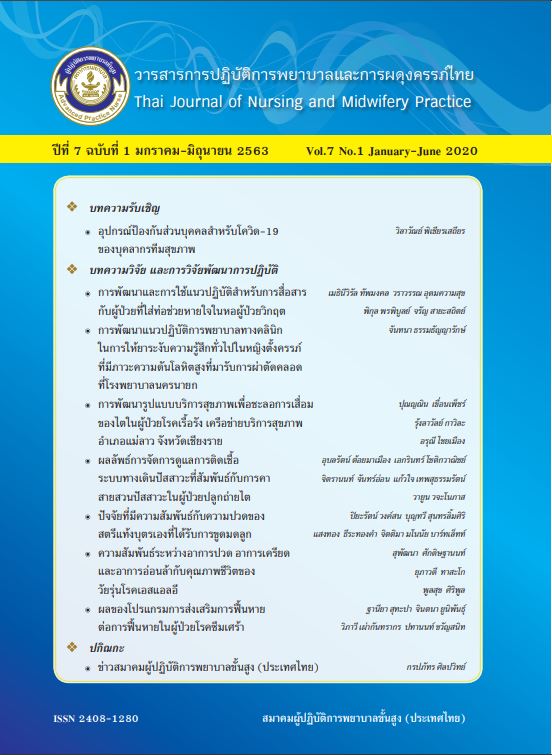The Effect of a Recovery Promotion Program on Recovery Among Persons with Major Depressive Disorders
Main Article Content
Abstract
This quasi-experimental research with the posttest only control groups design aimed to evaluate the effectiveness of recovery promotion program on recovery in persons with Major Depressive Disorders (MDD). The subjects were outpatient with MDD at a psychiatric institute. Total of 36 patients were matched pairs by age and gender which 18 subjects were randomly assigned to the recovery promotion program and the other 18 subjects were assigned to the control group with usual care. Instrument was a 4 weeks recovery promotion program, consisted of individual therapeutic relationship, group supportive psychotherapy and family psycho-education to encourage strength selfefficacy, resourcefulness, purpose in life, social support, protect/decrease alcohol consumption and medication adherence. The recovery was measured by The Thai-Mental Health Recovery Measure (Thai-MHRM) and the data of both groups were analyzed using t- test. Results revealed that the difference of recovery of persons with MDD in recovery promotion program group (mean = 97.17, SD = 11.48) was higher than usual care group (mean = 75.94, SD = 15.81) with statistically significant at the level of p<.01. Findings suggest that recovery promotion program can be used to promote the recovery of persons with MDD.
Downloads
Article Details
References
Zauszniewski JA. Health-seeking resources and adaptive functioning in depressed and non-depressed adults. Psychiatr Nurs 1994;8(3):159-68.
IsHak WW, James MD, Mirocha J, Youssef H, Tobia G, Pi S, et al. Patient-reported functioning in major depressive disorder. Ther Adv Chronic Dis 2016;7(3):160-9.
Stewart WF, Ricci JA, Chee E, Hahn SR, Morganstein D. Cost of lost productive work time among US workers with depression. JAMA 2003;289(23): 3135-44.
Zimmerman M, Posternak MA, McGlinchey J, Friedman M, Attiullah N, Boerescu D. Validity of a self-report depression symptom scale for identifying remission in depressed outpatients. Compr Psychiatry 2006;47(3):185-8.
Young SL, Ensing DS. Exploring recovery from the perspective of people with psychiatric disabilities. Psychiatric Rehabil J 1999;22(3):219-31.
Vorapatratorn N. Predicting factors of recovery among persons with major disorder [dissertation]. Bangkok: Chulalongkorn University;2017.
Khamkum P. The effect of psychoeducation program on medication adherence among patients with depression [dissertation]. Pathumthani: Thammasat University;2011. (In Thai)
Masters K. Nursing theories: a framework for professional practice. Sudbury (MA): Jones and Bartlett Publisher;2012.
Yalom ID. The theory and practice of group psychotherapy. 4thed. New York: Basic Books;1995.
Anderson CM, Reiss DJ, Hogarty GE. Schizophrenia and the family a practitioner’s guide to psychoeducation and management. New York: Guilford press;1986.
Glazer GL, Pressler JL. Schlotfeldt’s health seeking nursing model. In: Fitzpatrick JJ, Whall AL, editors. Conceptual models of nursing practice. Englewood Cliffs(NJ): Prentice-Hall;1989.p.241-53.
Shadish W, Cook T, Campell D. Experiment and quasi-experimental designs for generalized causal lnference. New York: Hough tonm Iflin;2002.
Polit DF, Beck CT. Nursing research: generating and assessing evidence for nursing practice. 8thed. Philadelphia: Lippincott William and Wilkins;2008.
Zhao R, Tsai C, Chaichanasakul A, Flores LY, Lopez S. A validity and reliability study of the strength self-efficacy. Poster presented at the 118th Annual Meeting of the American Psychological Association; 2010 Aug 12-15; San Diego (CA), USA;2010.
Lotrakul M, Sukanich P, Sukying C. The reliability and validity of Thai version of Hamilton rating scale for depression. J Psychiatr Assoc Thailand 1996;41(4):235-46.
Burns N, Grove SK. The practice of nursing research conduct, critique, and utilization. 5thed. St.Louis (MO): Elsevier Saunders;2005.
Barber JP, Connolly MB, Crits-Christoph P, Gladis L, Siqueland L. Alliance predicts patients’ outcome beyond in-treatment change in symptoms. J Consult Clin Psychol 2000;68(6):1027-32.
Perese EF. Psychiatric advanced practice nursing: a biopsychosocial foundation for practice. Philadelphia: Davis Company;2012.
Nasser EH, Overholser JC. Recovery from major depression: The role of support from family, friends, and spiritual beliefs. Acta Psychiatr Scand 2005;111(2):125-32.
Johnson SL, Mayer B, Winett C, Small J. Social support and self-esteem predict changes in bipolar depression but not mania. J Affect Disord 2000; 58(1):79-86.
Cook AJ, Copeland EM, Floyd BC, Jonikas AJ, Hamilton MM, Razzano L, et al. A randomized controlled trial of effects of wellness recovery action planning on depression, anxiety, and recovery. Psychiatr Serv 2012;63(6):541-7.
Fava GA, Ruini C, Rafanelli C, Finos L, Conti S, Grandi S. Six-year outcome of cognitive behavior therapy for prevention of recurrent depression. Am J Psychiatry 2004;161(10):1872-6.
Vilhauer JS, Cortes J, Moali N, Chung S, Mirocha J, Ishak WW. Improving quality of life for patients with major depressive disorder by increasing hope and positive expectations with future directed therapy (FDT). Innov Clin Neurosci 2013;10(3):12-22.
Jenaabadi H, Nejad AB, Fatehrad G. Efficacy of quality of life therapy on increasing happiness in patients with major depressive disorder. Open J Psychiatr 2015;5(2):207-13.


